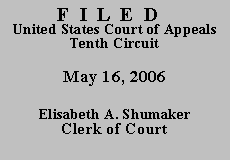

| LISA JANE GRAHAM, | No. 05-3485
(D.C. No. 03-CV-3075-SAC) (D. Kan.) |
OF APPEALABILITY
After being convicted of making a criminal threat, battery, and criminal trespass in 1999, Graham appealed to the Kansas Court of Appeals arguing that her rights to a fair trial and to a unanimous jury verdict were violated by the trial court's failure to give the jury a unanimity instruction. The Court of Appeals affirmed the convictions, and the Kansas Supreme Court denied review.
Graham then filed a petition for post-conviction relief in Saline County District Court under K.S.A. § 60-1507, alleging that she had been denied effective assistance of counsel both during trial and on direct appeal ("first application for post-conviction relief"). Summarily denying her petition, the state district court found Graham's claim was "moot" because she was serving a term of imprisonment imposed for another subsequent criminal violation. Graham did not appeal this judgment. Instead, she filed a second § 60-1507 petition reasserting her ineffective assistance of counsel claim and alleging misconduct by the prosecutor in his closing argument and error by the trial court in not instructing the jury on lesser included crimes ("second application for post-conviction relief"). This petition was summarily dismissed as successive, and, as a result, Graham was precluded from filing additional challenges (including an appeal of this second denial) without the permission of the court. Thus, even though Graham filed a notice of appeal of this second petition, no appeal was docketed by the Kansas Court of Appeals.
Graham then filed the instant § 2254 habeas petition in federal district court repeating the claims asserted in her second § 60-1507 petition. The district court denied the petition finding that Graham procedurally defaulted by failing to comply with state rules for filing an appeal from the denial of post-conviction relief. Her subsequent application for a COA was also denied. Failing to secure a COA from that court, Graham now seeks a COA from this court.(1)
Under 28 U.S.C. § 2254(b)(1), habeas corpus may not be granted unless the applicant has exhausted the remedies available in the state courts. "The exhaustion requirement is satisfied if the federal issue has been properly presented to the highest state court, either by direct review of the conviction or in a postconviction attack." Dever v. Kansas State Penitentiary, 36 F.3d 1531, 1534 (10th Cir. 1994).
Graham failed to appeal the denial of her first post-conviction petition. "This court may not consider issues raised in a habeas petition 'that have been defaulted in state court on an independent and adequate procedural ground [ ] unless the petitioner can demonstrate cause and prejudice or a miscarriage of justice.'" Thomas v. Gibson, 218 F.3d 1213, 1221 (10th Cir. 2000) (alteration in original) (citation omitted).
In this case, Graham procedurally defaulted twice. She first defaulted when she failed to appeal the denial of her first application for post-conviction relief. She also procedurally defaulted with respect to her second application for post-conviction relief by failing to comply with state rules for filing an appeal. Because Graham failed to exhaust her state court remedies, we may not review her claims unless she shows "cause and prejudice or a fundamental miscarriage of justice." Id.
Graham argues that counsel during her criminal trial and direct appeal failed to preserve or raise claims of constitutional deprivation based on the alleged misconduct of the prosecutor and the trial court's failure to properly instruct the jury. Attorney error amounting to constitutionally ineffective assistance of counsel can constitute "cause" for a petitioner's procedural default. See Coleman v. Thompson, 501 U.S. 722, 754 (1991). However, an ineffective assistance of counsel claim asserted as cause must be presented as an independent claim to the state courts. Hawkins v. Mullin, 291 F.3d 658, 670 (10th Cir. 2002). If, as in this case, that independent claim of ineffective assistance of counsel was itself procedurally defaulted, then petitioner must establish cause and prejudice for that default before the independent claim of ineffective assistance of counsel can serve as "cause and prejudice" for her other defaulted claims. See Edwards v. Carpenter, 529 U.S. 446, 453 (2000).
As to her first procedural default, Graham states only that she was unaware of her legal right to appeal the denial of relief on her first post-conviction motion. Graham's ignorance of applicable rules, however, does not demonstrate cause. See Watson v. New Mexico, 45 F.3d 385, 388 (10th Cir. 1995).
Graham's request for a COA is DENIED and the appeal is DISMISSED.
ENTERED FOR THE COURT
Carlos F. Lucero
Circuit Judge
1. Graham's petition was filed after April 24,
1996, the effective date of the
Antiterrorism and Effective Death Penalty Act ("AEDPA"); as a result, AEDPA's
provisions apply to this case. See Rogers v. Gibson, 173 F.3d 1278, 1282 n.1
(10th Cir. 1999) (citing Lindh v. Murphy, 521 U.S. 320 (1997)).
AEDPA
conditions a petitioner's right to appeal a denial of habeas relief under § 2254
upon a grant of a COA. 28 U.S.C. § 2253(c)(1)(A). A COA may be issued "only
if the applicant has made a substantial showing of the denial of a constitutional
right." § 2253(c)(2). This requires Graham to show "that reasonable jurists
could debate whether (or, for that matter, agree that) the petition should have
been resolved in a different manner or that the issues presented were adequate to
deserve encouragement to proceed further." Slack v. McDaniel, 529 U.S. 473,
484 (2000) (quotations omitted). Because the district court denied Graham a
COA, she may not appeal the district court's decision
absent a grant of COA by
this court.
![]() | Keyword |
Case |
Docket |
Date: Filed /
Added |
| Keyword |
Case |
Docket |
Date: Filed /
Added |
![]() (18005 bytes)
(18005 bytes)
![]() (12141 bytes)
(12141 bytes)
Comments to: WebMaster,
ca10 [at] washburnlaw.edu.
Updated: May 17, 2006.
HTML markup © 2006, Washburn University School of Law.
URL: http://ca10.washburnlaw.edu/cases/2006/05/05-3485.htm.